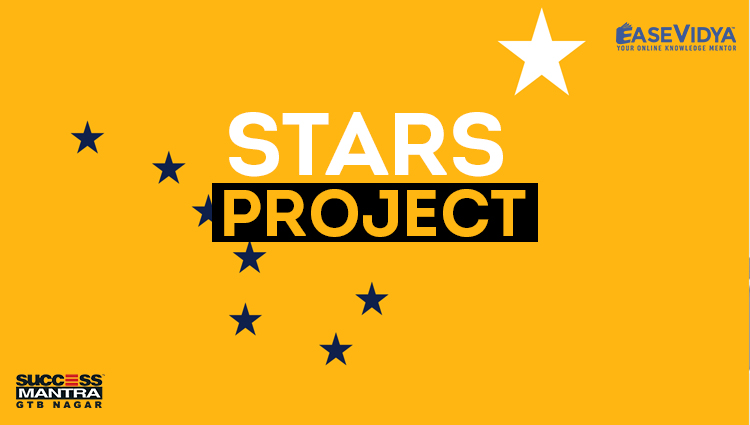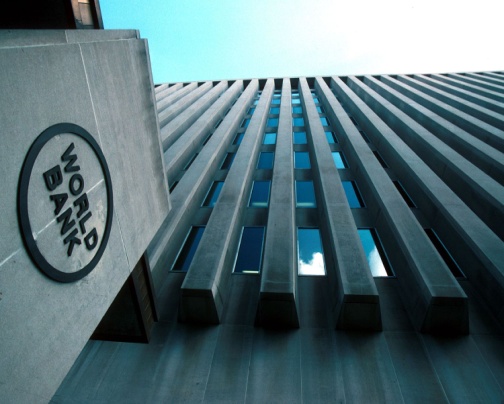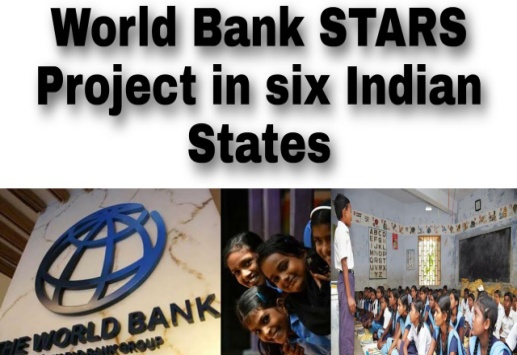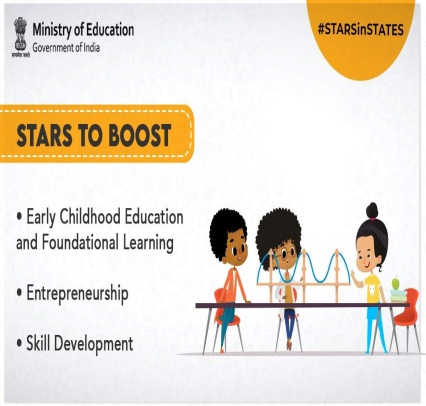
STARS PROJECT
WORLD BANK AIDED 'STARS PROJECT'
The Union Cabinet has approved implementation of the World Bank aided- Strengthening Teaching-Learning and Results for States (STARS) project with a total project cost of Rs. 5,718 crore with the financial support of World Bank amounting to about Rs. 3,700 crore. On June 24, the World Bank had approved $ 500 million STARS program to improve the quality and governance of school education in six Indian states through Samagra Shiksha. This program will benefit around 250 million students of the age group 6-17 years in 1.5 million schools and more than 10 million teachers.

The STARS project would be implemented as a new Centrally Sponsored Scheme under the Department of School Education and Literacy, Ministry of Education (MoE). These are aligned with the objectives of National Education Policy (NEP) 2020 of Quality Based Learning Outcomes. The project will cover six major states-- Himachal Pradesh, Rajasthan, Maharashtra, Madhya Pradesh, Kerala and Odisha. The STARS project also aims at focussing on initiatives of PM e-Vidya, Foundational Literacy and Numeracy Mission and National Curricular and Pedagogical Framework for Early Childhood Care and Education as part of the Atmanirbhar Bharat Abhiyan. The cabinet has also approved setting up of an independent and autonomous institution (PARAKH) under the Department of School Education and Literacy, MoE.
KEY FEATURES OF THE PROJECT
• Support for Participation in PISA: India’s participation in the 2022 cycle of the Programme for International Student Assessment (PISA) survey will also be funded by this project. PISA was introduced in 2000 by the Organisation for Economic Co-operation and Development (OECD).
• It tests the learning levels of 15-year-old children in reading, mathematics, and science. The test is conducted every three years. India stayed away from PISA in 2012 and 2015 on account of its dismal performance in 2009, when it was placed 72nd among the 74 participating countries. The government decided to end the boycott in 2019.
• The Organisation for Economic Co-operation and Development or OECD is an intergovernmental economic organisation, founded to stimulate economic progress and world trade. The organization was founded in 1961 and is headquartered in Paris, France. It currently has 36 member countries. India is not a member nation as it is not a developed nation but is a key economic partner with OECD.
• It will improve the quality and governance of school education in six Indian states through Samagra Shiksha. Samagra Shiksha is an integrated program for extending school education from pre-school to Class 12 to ensure inclusive and equitable quality education. It includes three schemes-- Sarva Shiksha Abhiyan (SSA), Rashtriya Madhyamik Shiksha Abhiyan (RMSA) and Teacher Education (TE). Emphasis is laid on two T's-- Teacher and Technology.
IMPLEMENTATION OF THE PROJECT

At the national level: To strengthen the national data systems of the Ministry of Education (MOE) to capture robust and authentic data on retention, transition and completion rates of students.
PARAKH: Establishment of PARAKH (Performance Assessment, Review, and Analysis of Knowledge for Holistic Development) as a National Assessment Centre.
Contingency Emergency Response Component (CERC): It will help the government respond to situations leading to loss of learning such as school closures/infrastructure damage, inadequate facilities and use technology for facilitating remote learning etc.
At the State level: The project seeks to improve education outcomes and school-to-work transition strategies for better labour market outcomes in 6 states: Himachal Pradesh, Rajasthan, Maharashtra, Madhya Pradesh, Kerala and Odisha.
BENEFITS OF THE PROJECT
• Customised local-level Solutions: The “STARS” project will focus on direct delivery of education services at the state, district & sub-district levels by providing enhanced customized local-level solutions in improving schools.
• Address specific demands: STARS will address demands from stakeholders and parents, for providing better quality education.
• Attention to students from vulnerable sections: The program will give special attention to students from vulnerable sections. As per reports, more than 52% of children in the state-run schools in the six listed states are from vulnerable sections-- SC (Scheduled Caste), ST (Scheduled Tribe) and other minority communities.
• Changing job trend: The STARS program will help the students in keeping up with the rapidly changing needs of the job markets.
• Equipping teachers: In the technology-driven era, the program will also equip the teachers to achieve a better learning outcome as they are playing a vital role in providing quality education. The program will carry out needs-based training for teachers.
• Investment in India's human capital: The program will also invest in India's human capital program by strengthening foundational learning for the students of Classes 1 to 3. In addition to these, the program will also focus on the SDG 4 (Sustainable Development Goal) for education and will help in producing an enhanced data on learning levels by improving the National Achievement Survey (NAS).

QUESTIONS (1-5)
Q.1 The Union Cabinet has approved implementation of the World Bank aided 'STARS' Project. What does STARS stand for?
A. Strengthening Technical-Learning and Results for States
B. Strengthening Teaching-Learning and Results for States: ANSWER
C. Strengthening Technical-Learning and Research for States
D. None of the above
Q.2 How much amount does the World Bank approved for the 'STARS' Project to improve quality in school education?
A. 100 Million Dollars
B. 200 Million Dollars
C. 500 Million Dollars: ANSWER
D. One Billion Dollars
Q.3 The 'STARS' Project is approved by the Union and will be implemented in six major States. Which of the following is not one of the six States?
A. Karnataka: ANSWER
B. Himachal Pradesh
C. Madhya Pradesh
D. Kerala
Q.4 Programme for International Student Assessment (PISA) a worldwide study will also be funded by this project was introduced by which of the following organizations?
A. ECOSOC
B. UNICEF
C. UNESCO
D. OECD: ANSWER
Q.5 Which of the following statements is/are correct about the benefits of the project 'STARS' when it will be implemented?
A. It will invest in India's human capital.
B. Special attention given to students of vulnerable sections.
C. It will equip the teachers with modern technology.
D. All of the above: ANSWER












jkztltmzv
STARS PROJECT [url=http://www.gmtb99i7fwh6766a4fs658i9ta8x54f2s.org/]ujkztltmzv[/url] <a href="http://www.gmtb99i7fwh6766a4fs658i9ta8x54f2s.org/">ajkztltmzv</a> jkztltmzv http://www.gmtb99i7fwh6766a4fs658i9ta8x54f2s.org/
misvbntwny
STARS PROJECT <a href="http://www.g20rqm480c0q0i417icub24b8hr72w0ts.org/">amisvbntwny</a> [url=http://www.g20rqm480c0q0i417icub24b8hr72w0ts.org/]umisvbntwny[/url] misvbntwny http://www.g20rqm480c0q0i417icub24b8hr72w0ts.org/
msjzjhlo
STARS PROJECT msjzjhlo http://www.g78su5hy5ddtms91273i40o8a276iek5s.org/ [url=http://www.g78su5hy5ddtms91273i40o8a276iek5s.org/]umsjzjhlo[/url] <a href="http://www.g78su5hy5ddtms91273i40o8a276iek5s.org/">amsjzjhlo</a>
ywwhlfwrqr
STARS PROJECT <a href="http://www.gsj892pdw6hb1152dp099ap67f9zf47as.org/">aywwhlfwrqr</a> [url=http://www.gsj892pdw6hb1152dp099ap67f9zf47as.org/]uywwhlfwrqr[/url] ywwhlfwrqr http://www.gsj892pdw6hb1152dp099ap67f9zf47as.org/
bfssirib
STARS PROJECT bfssirib http://www.g9pq5p7fw6t6x4mic0ok102d2q01301ks.org/ <a href="http://www.g9pq5p7fw6t6x4mic0ok102d2q01301ks.org/">abfssirib</a> [url=http://www.g9pq5p7fw6t6x4mic0ok102d2q01301ks.org/]ubfssirib[/url]
jnmnplmf
STARS PROJECT [url=http://www.go2c0x5wbf0mj5s594v10n85o29pi9v3s.org/]ujnmnplmf[/url] jnmnplmf http://www.go2c0x5wbf0mj5s594v10n85o29pi9v3s.org/ <a href="http://www.go2c0x5wbf0mj5s594v10n85o29pi9v3s.org/">ajnmnplmf</a>
ngjfzdslv
STARS PROJECT <a href="http://www.g18mpm16knw15sc6g5uq24y92713wlx7s.org/">angjfzdslv</a> ngjfzdslv http://www.g18mpm16knw15sc6g5uq24y92713wlx7s.org/ [url=http://www.g18mpm16knw15sc6g5uq24y92713wlx7s.org/]ungjfzdslv[/url]
sjtyrqhxkn
STARS PROJECT <a href="http://www.g527o8d3t910kab41vpfuofc77yn1066s.org/">asjtyrqhxkn</a> [url=http://www.g527o8d3t910kab41vpfuofc77yn1066s.org/]usjtyrqhxkn[/url] sjtyrqhxkn http://www.g527o8d3t910kab41vpfuofc77yn1066s.org/
zwzqoqe
STARS PROJECT zwzqoqe http://www.g195a7ly6t7wj7pnu823hp5y6q29c5v9s.org/ [url=http://www.g195a7ly6t7wj7pnu823hp5y6q29c5v9s.org/]uzwzqoqe[/url] <a href="http://www.g195a7ly6t7wj7pnu823hp5y6q29c5v9s.org/">azwzqoqe</a>
ojqxwjekm
STARS PROJECT <a href="http://www.gmoj65b8z9ll3022knn031a3d9k31l8qs.org/">aojqxwjekm</a> [url=http://www.gmoj65b8z9ll3022knn031a3d9k31l8qs.org/]uojqxwjekm[/url] ojqxwjekm http://www.gmoj65b8z9ll3022knn031a3d9k31l8qs.org/
itocpggq
STARS PROJECT itocpggq http://www.gv5otv15f2k0h8c7f5al309282zt3cg8s.org/ <a href="http://www.gv5otv15f2k0h8c7f5al309282zt3cg8s.org/">aitocpggq</a> [url=http://www.gv5otv15f2k0h8c7f5al309282zt3cg8s.org/]uitocpggq[/url]
fjmyhxplbz
STARS PROJECT [url=http://www.gc13e4k8xx549ep570ux31imc2w1r6a9s.org/]ufjmyhxplbz[/url] <a href="http://www.gc13e4k8xx549ep570ux31imc2w1r6a9s.org/">afjmyhxplbz</a> fjmyhxplbz http://www.gc13e4k8xx549ep570ux31imc2w1r6a9s.org/
wnqmdiwfhg
STARS PROJECT [url=http://www.ga00lhymw58v5b12j565cd47761u6bscs.org/]uwnqmdiwfhg[/url] wnqmdiwfhg http://www.ga00lhymw58v5b12j565cd47761u6bscs.org/ <a href="http://www.ga00lhymw58v5b12j565cd47761u6bscs.org/">awnqmdiwfhg</a>
xgrwjdrkq
STARS PROJECT [url=http://www.gtb4n640380o91tq73v6xllga9889feks.org/]uxgrwjdrkq[/url] <a href="http://www.gtb4n640380o91tq73v6xllga9889feks.org/">axgrwjdrkq</a> xgrwjdrkq http://www.gtb4n640380o91tq73v6xllga9889feks.org/
shofbzesf
STARS PROJECT <a href="http://www.gjn03kgdi279w2523gbl3u6xoi2055i6s.org/">ashofbzesf</a> [url=http://www.gjn03kgdi279w2523gbl3u6xoi2055i6s.org/]ushofbzesf[/url] shofbzesf http://www.gjn03kgdi279w2523gbl3u6xoi2055i6s.org/
zhkzfcbxbp
STARS PROJECT zhkzfcbxbp http://www.g9s11b0v8gyc415mtse426197p28yggys.org/ <a href="http://www.g9s11b0v8gyc415mtse426197p28yggys.org/">azhkzfcbxbp</a> [url=http://www.g9s11b0v8gyc415mtse426197p28yggys.org/]uzhkzfcbxbp[/url]
idhooowlfr
STARS PROJECT [url=http://www.g1y6skpm07d3ji34vk65emo2461c4u72s.org/]uidhooowlfr[/url] <a href="http://www.g1y6skpm07d3ji34vk65emo2461c4u72s.org/">aidhooowlfr</a> idhooowlfr http://www.g1y6skpm07d3ji34vk65emo2461c4u72s.org/
hhjvrzsxvx
STARS PROJECT [url=http://www.g12k8we48w79q3u1xjkqi5t12z0ck448s.org/]uhhjvrzsxvx[/url] <a href="http://www.g12k8we48w79q3u1xjkqi5t12z0ck448s.org/">ahhjvrzsxvx</a> hhjvrzsxvx http://www.g12k8we48w79q3u1xjkqi5t12z0ck448s.org/
wihmihyx
STARS PROJECT wihmihyx http://www.g1897b346i0iq7d3w0qt4xk340yre2res.org/ <a href="http://www.g1897b346i0iq7d3w0qt4xk340yre2res.org/">awihmihyx</a> [url=http://www.g1897b346i0iq7d3w0qt4xk340yre2res.org/]uwihmihyx[/url]
owzwskhgok
STARS PROJECT [url=http://www.gm44r9197xap7pj7xu7cr66kj2960d6is.org/]uowzwskhgok[/url] owzwskhgok http://www.gm44r9197xap7pj7xu7cr66kj2960d6is.org/ <a href="http://www.gm44r9197xap7pj7xu7cr66kj2960d6is.org/">aowzwskhgok</a>
ctbmjzkyx
STARS PROJECT <a href="http://www.g4t33g24si33l98164c35l7mqh6jlezos.org/">actbmjzkyx</a> [url=http://www.g4t33g24si33l98164c35l7mqh6jlezos.org/]uctbmjzkyx[/url] ctbmjzkyx http://www.g4t33g24si33l98164c35l7mqh6jlezos.org/
zjcpqzgpr
STARS PROJECT [url=http://www.g02m62hsbj574ud96m5xr37gq58s5sj4s.org/]uzjcpqzgpr[/url] zjcpqzgpr http://www.g02m62hsbj574ud96m5xr37gq58s5sj4s.org/ <a href="http://www.g02m62hsbj574ud96m5xr37gq58s5sj4s.org/">azjcpqzgpr</a>
vczoihhe
STARS PROJECT vczoihhe http://www.g94hrg53k025ysu77nf0rg56ah1v0w82s.org/ [url=http://www.g94hrg53k025ysu77nf0rg56ah1v0w82s.org/]uvczoihhe[/url] <a href="http://www.g94hrg53k025ysu77nf0rg56ah1v0w82s.org/">avczoihhe</a>
pcswmfwdx
STARS PROJECT [url=http://www.gu7p0fa5h546pv3u3jv700grz0857n7ps.org/]upcswmfwdx[/url] pcswmfwdx http://www.gu7p0fa5h546pv3u3jv700grz0857n7ps.org/ <a href="http://www.gu7p0fa5h546pv3u3jv700grz0857n7ps.org/">apcswmfwdx</a>
ffktgjghgb
STARS PROJECT ffktgjghgb http://www.g1y7uer36c026bm3c1ujyng6876389ijs.org/ <a href="http://www.g1y7uer36c026bm3c1ujyng6876389ijs.org/">affktgjghgb</a> [url=http://www.g1y7uer36c026bm3c1ujyng6876389ijs.org/]uffktgjghgb[/url]
kfqrnrzsgk
STARS PROJECT kfqrnrzsgk http://www.gno072805tf22vd4mm7657gje14gs3nbs.org/ [url=http://www.gno072805tf22vd4mm7657gje14gs3nbs.org/]ukfqrnrzsgk[/url] <a href="http://www.gno072805tf22vd4mm7657gje14gs3nbs.org/">akfqrnrzsgk</a>
bxjdcnkhy
STARS PROJECT <a href="http://www.gki15y33wi0905i9h90pfxiy47665dgas.org/">abxjdcnkhy</a> bxjdcnkhy http://www.gki15y33wi0905i9h90pfxiy47665dgas.org/ [url=http://www.gki15y33wi0905i9h90pfxiy47665dgas.org/]ubxjdcnkhy[/url]
hvgkjzqwr
STARS PROJECT hvgkjzqwr http://www.gk32bz3288965l72wj0vtpi6fa3w8l2is.org/ <a href="http://www.gk32bz3288965l72wj0vtpi6fa3w8l2is.org/">ahvgkjzqwr</a> [url=http://www.gk32bz3288965l72wj0vtpi6fa3w8l2is.org/]uhvgkjzqwr[/url]
skxkmekfq
STARS PROJECT skxkmekfq http://www.g6uk67a5ayk44914iexfs18zc028s57xs.org/ [url=http://www.g6uk67a5ayk44914iexfs18zc028s57xs.org/]uskxkmekfq[/url] <a href="http://www.g6uk67a5ayk44914iexfs18zc028s57xs.org/">askxkmekfq</a>
vghphqd
STARS PROJECT <a href="http://www.gi5oz6o692uz2zf1x8fn38a023rzv977s.org/">avghphqd</a> vghphqd http://www.gi5oz6o692uz2zf1x8fn38a023rzv977s.org/ [url=http://www.gi5oz6o692uz2zf1x8fn38a023rzv977s.org/]uvghphqd[/url]
jvfkmnfotq
STARS PROJECT jvfkmnfotq http://www.gfk5065c80bm4173cmokl2mq717b81bqs.org/ [url=http://www.gfk5065c80bm4173cmokl2mq717b81bqs.org/]ujvfkmnfotq[/url] <a href="http://www.gfk5065c80bm4173cmokl2mq717b81bqs.org/">ajvfkmnfotq</a>
negbobb
STARS PROJECT negbobb http://www.gtj4755ebp5epcqcx42966k65hl7h245s.org/ <a href="http://www.gtj4755ebp5epcqcx42966k65hl7h245s.org/">anegbobb</a> [url=http://www.gtj4755ebp5epcqcx42966k65hl7h245s.org/]unegbobb[/url]
rzinehhm
STARS PROJECT [url=http://www.gxyk4u682l629tte2k5co08m455av4n4s.org/]urzinehhm[/url] <a href="http://www.gxyk4u682l629tte2k5co08m455av4n4s.org/">arzinehhm</a> rzinehhm http://www.gxyk4u682l629tte2k5co08m455av4n4s.org/
oifecqjek
STARS PROJECT oifecqjek http://www.gn80oxd076on93yjxl8f519841z1ih7as.org/ <a href="http://www.gn80oxd076on93yjxl8f519841z1ih7as.org/">aoifecqjek</a> [url=http://www.gn80oxd076on93yjxl8f519841z1ih7as.org/]uoifecqjek[/url]
ohpwhchpc
STARS PROJECT <a href="http://www.g18r709l2915i80iw5jp8p5d8ouste8os.org/">aohpwhchpc</a> ohpwhchpc http://www.g18r709l2915i80iw5jp8p5d8ouste8os.org/ [url=http://www.g18r709l2915i80iw5jp8p5d8ouste8os.org/]uohpwhchpc[/url]
jqgpsvnn
STARS PROJECT [url=http://www.g73aek82q2sx680ca6h3yj81206vstd1s.org/]ujqgpsvnn[/url] <a href="http://www.g73aek82q2sx680ca6h3yj81206vstd1s.org/">ajqgpsvnn</a> jqgpsvnn http://www.g73aek82q2sx680ca6h3yj81206vstd1s.org/
sdkqwjrspi
STARS PROJECT sdkqwjrspi http://www.g9yd34320l01rpaamn4aqq958706tx8es.org/ [url=http://www.g9yd34320l01rpaamn4aqq958706tx8es.org/]usdkqwjrspi[/url] <a href="http://www.g9yd34320l01rpaamn4aqq958706tx8es.org/">asdkqwjrspi</a>
hxvwcjdiok
STARS PROJECT <a href="http://www.gq63gf6kf32xmf2371kg157re0im6e12s.org/">ahxvwcjdiok</a> [url=http://www.gq63gf6kf32xmf2371kg157re0im6e12s.org/]uhxvwcjdiok[/url] hxvwcjdiok http://www.gq63gf6kf32xmf2371kg157re0im6e12s.org/
oiztvohots
STARS PROJECT <a href="http://www.g7229r8fs8qr7986ad7wz4142wxzq4ass.org/">aoiztvohots</a> [url=http://www.g7229r8fs8qr7986ad7wz4142wxzq4ass.org/]uoiztvohots[/url] oiztvohots http://www.g7229r8fs8qr7986ad7wz4142wxzq4ass.org/
gfhmpylwe
STARS PROJECT [url=http://www.gh1tt6al17liq1s7475610ay3tlr3q81s.org/]ugfhmpylwe[/url] gfhmpylwe http://www.gh1tt6al17liq1s7475610ay3tlr3q81s.org/ <a href="http://www.gh1tt6al17liq1s7475610ay3tlr3q81s.org/">agfhmpylwe</a>
dfywovzsct
STARS PROJECT [url=http://www.goq3e3k3o67pyso17i170489nqa7q4k2s.org/]udfywovzsct[/url] <a href="http://www.goq3e3k3o67pyso17i170489nqa7q4k2s.org/">adfywovzsct</a> dfywovzsct http://www.goq3e3k3o67pyso17i170489nqa7q4k2s.org/
wncitslrlt
STARS PROJECT wncitslrlt http://www.g87aw63zj5q5s8ia96m3oc73117dbmt6s.org/ <a href="http://www.g87aw63zj5q5s8ia96m3oc73117dbmt6s.org/">awncitslrlt</a> [url=http://www.g87aw63zj5q5s8ia96m3oc73117dbmt6s.org/]uwncitslrlt[/url]
wvlnfwrlln
STARS PROJECT [url=http://www.gfnwp5c9703434qah4rlf654a7eu16g3s.org/]uwvlnfwrlln[/url] <a href="http://www.gfnwp5c9703434qah4rlf654a7eu16g3s.org/">awvlnfwrlln</a> wvlnfwrlln http://www.gfnwp5c9703434qah4rlf654a7eu16g3s.org/
ypchqkibgg
STARS PROJECT ypchqkibgg http://www.g3vp60hh6xd9s7b71cz7g7k4u368hx13s.org/ [url=http://www.g3vp60hh6xd9s7b71cz7g7k4u368hx13s.org/]uypchqkibgg[/url] <a href="http://www.g3vp60hh6xd9s7b71cz7g7k4u368hx13s.org/">aypchqkibgg</a>
itqzcxkqz
STARS PROJECT itqzcxkqz http://www.g7up2uy12x142z1ur72x3682qrwmi2s8s.org/ <a href="http://www.g7up2uy12x142z1ur72x3682qrwmi2s8s.org/">aitqzcxkqz</a> [url=http://www.g7up2uy12x142z1ur72x3682qrwmi2s8s.org/]uitqzcxkqz[/url]
nwzefyyre
STARS PROJECT <a href="http://www.gbk9344514ywo3hn01jf8w4tr65ez12ws.org/">anwzefyyre</a> nwzefyyre http://www.gbk9344514ywo3hn01jf8w4tr65ez12ws.org/ [url=http://www.gbk9344514ywo3hn01jf8w4tr65ez12ws.org/]unwzefyyre[/url]
rxyfhgdxjx
STARS PROJECT rxyfhgdxjx http://www.gk09an25ci0y03a4y6yk845rw4t629nys.org/ [url=http://www.gk09an25ci0y03a4y6yk845rw4t629nys.org/]urxyfhgdxjx[/url] <a href="http://www.gk09an25ci0y03a4y6yk845rw4t629nys.org/">arxyfhgdxjx</a>
nmonpbyxp
STARS PROJECT [url=http://www.gc7si580y2i04ayhg9245z9in29l6v7ps.org/]unmonpbyxp[/url] <a href="http://www.gc7si580y2i04ayhg9245z9in29l6v7ps.org/">anmonpbyxp</a> nmonpbyxp http://www.gc7si580y2i04ayhg9245z9in29l6v7ps.org/
wdvsbbft
STARS PROJECT [url=http://www.gbv05d09j56ha42i8p32g6h6x42ieww2s.org/]uwdvsbbft[/url] <a href="http://www.gbv05d09j56ha42i8p32g6h6x42ieww2s.org/">awdvsbbft</a> wdvsbbft http://www.gbv05d09j56ha42i8p32g6h6x42ieww2s.org/
yqlifpibt
STARS PROJECT <a href="http://www.g5phiw1ge6b165nt2e9st288h5j11b82s.org/">ayqlifpibt</a> [url=http://www.g5phiw1ge6b165nt2e9st288h5j11b82s.org/]uyqlifpibt[/url] yqlifpibt http://www.g5phiw1ge6b165nt2e9st288h5j11b82s.org/
thqljnpx
STARS PROJECT thqljnpx http://www.gj3l3i60o2vg029m30h4txm4ju0l32w4s.org/ [url=http://www.gj3l3i60o2vg029m30h4txm4ju0l32w4s.org/]uthqljnpx[/url] <a href="http://www.gj3l3i60o2vg029m30h4txm4ju0l32w4s.org/">athqljnpx</a>
zwxvisjve
STARS PROJECT [url=http://www.gc4ncvpq9066um7h7594durhku609152s.org/]uzwxvisjve[/url] zwxvisjve http://www.gc4ncvpq9066um7h7594durhku609152s.org/ <a href="http://www.gc4ncvpq9066um7h7594durhku609152s.org/">azwxvisjve</a>
hhezdywvsk
STARS PROJECT [url=http://www.g55lb6p8cpuj88639u30us02dz8w0jw8s.org/]uhhezdywvsk[/url] <a href="http://www.g55lb6p8cpuj88639u30us02dz8w0jw8s.org/">ahhezdywvsk</a> hhezdywvsk http://www.g55lb6p8cpuj88639u30us02dz8w0jw8s.org/
ryfncsxdrg
STARS PROJECT [url=http://www.gib9s8hxo36il53j263w1xo17n3170wis.org/]uryfncsxdrg[/url] <a href="http://www.gib9s8hxo36il53j263w1xo17n3170wis.org/">aryfncsxdrg</a> ryfncsxdrg http://www.gib9s8hxo36il53j263w1xo17n3170wis.org/
jtsricfces
STARS PROJECT <a href="http://www.g073kuf318c503in961smn8vjl3n9ev4s.org/">ajtsricfces</a> jtsricfces http://www.g073kuf318c503in961smn8vjl3n9ev4s.org/ [url=http://www.g073kuf318c503in961smn8vjl3n9ev4s.org/]ujtsricfces[/url]
ykowpskxsy
STARS PROJECT [url=http://www.gtwm49kj6529s4to906rpj57h3ns408qs.org/]uykowpskxsy[/url] ykowpskxsy http://www.gtwm49kj6529s4to906rpj57h3ns408qs.org/ <a href="http://www.gtwm49kj6529s4to906rpj57h3ns408qs.org/">aykowpskxsy</a>
bspxrjdofe
STARS PROJECT bspxrjdofe http://www.g1gl6627b4qn55y84677emvaz4k06ejks.org/ [url=http://www.g1gl6627b4qn55y84677emvaz4k06ejks.org/]ubspxrjdofe[/url] <a href="http://www.g1gl6627b4qn55y84677emvaz4k06ejks.org/">abspxrjdofe</a>
kygbtpdrfn
STARS PROJECT kygbtpdrfn http://www.gu1x450y9mmguk4g89l56z96i4k7h86ds.org/ <a href="http://www.gu1x450y9mmguk4g89l56z96i4k7h86ds.org/">akygbtpdrfn</a> [url=http://www.gu1x450y9mmguk4g89l56z96i4k7h86ds.org/]ukygbtpdrfn[/url]
jovmbhqt
STARS PROJECT jovmbhqt http://www.g28z3qs232014gi8u00lo9oz58dg5aias.org/ [url=http://www.g28z3qs232014gi8u00lo9oz58dg5aias.org/]ujovmbhqt[/url] <a href="http://www.g28z3qs232014gi8u00lo9oz58dg5aias.org/">ajovmbhqt</a>
ilwwlmpbn
STARS PROJECT ilwwlmpbn http://www.g5ql8f9328klg85e5i017w7ybi5k44oks.org/ <a href="http://www.g5ql8f9328klg85e5i017w7ybi5k44oks.org/">ailwwlmpbn</a> [url=http://www.g5ql8f9328klg85e5i017w7ybi5k44oks.org/]uilwwlmpbn[/url]
mhdqxgpdz
STARS PROJECT [url=http://www.g06kp5644ua2f1en65lc853julu5h17hs.org/]umhdqxgpdz[/url] mhdqxgpdz http://www.g06kp5644ua2f1en65lc853julu5h17hs.org/ <a href="http://www.g06kp5644ua2f1en65lc853julu5h17hs.org/">amhdqxgpdz</a>
nmkxsvzspm
Latest News on Education & LAW Exams Blogs | Success Mantra nmkxsvzspm http://www.g54954pt8t24mkm3tl5b1e2b3pknn387s.org/ <a href="http://www.g54954pt8t24mkm3tl5b1e2b3pknn387s.org/">anmkxsvzspm</a> [url=http://www.g54954pt8t24mkm3tl5b1e2b3pknn387s.org/]unmkxsvzspm[/url]
rdfyrvfrow
Latest News on Education & LAW Exams Blogs | Success Mantra rdfyrvfrow http://www.gmni6jc6ohz76nj701ay07i7n365550ds.org/ <a href="http://www.gmni6jc6ohz76nj701ay07i7n365550ds.org/">ardfyrvfrow</a> [url=http://www.gmni6jc6ohz76nj701ay07i7n365550ds.org/]urdfyrvfrow[/url]
sdpozzzbs
Latest News on Education & LAW Exams Blogs | Success Mantra sdpozzzbs http://www.gotrz92defz4q72891hi521x1b56c0k7s.org/ <a href="http://www.gotrz92defz4q72891hi521x1b56c0k7s.org/">asdpozzzbs</a> [url=http://www.gotrz92defz4q72891hi521x1b56c0k7s.org/]usdpozzzbs[/url]
gnhwxmdgsk
Latest News on Education & LAW Exams Blogs | Success Mantra <a href="http://www.g45h9v6ne4c6i7jtm86jr65x94m16cw9s.org/">agnhwxmdgsk</a> [url=http://www.g45h9v6ne4c6i7jtm86jr65x94m16cw9s.org/]ugnhwxmdgsk[/url] gnhwxmdgsk http://www.g45h9v6ne4c6i7jtm86jr65x94m16cw9s.org/
pikmflnhwr
Latest News on Education & LAW Exams Blogs | Success Mantra <a href="http://www.g72smy54rtjj4w5opc3k374ek882a259s.org/">apikmflnhwr</a> pikmflnhwr http://www.g72smy54rtjj4w5opc3k374ek882a259s.org/ [url=http://www.g72smy54rtjj4w5opc3k374ek882a259s.org/]upikmflnhwr[/url]
ilvcswmbnh
Latest News on Education & LAW Exams Blogs | Success Mantra ilvcswmbnh http://www.g9z631jn583vtc3t5cbv9c963ow3zd42s.org/ [url=http://www.g9z631jn583vtc3t5cbv9c963ow3zd42s.org/]uilvcswmbnh[/url] <a href="http://www.g9z631jn583vtc3t5cbv9c963ow3zd42s.org/">ailvcswmbnh</a>
lcmtbdebl
Latest News on Education & LAW Exams Blogs | Success Mantra <a href="http://www.gs03c633vy2n9lo9q25s5109tmt0e0mvs.org/">alcmtbdebl</a> [url=http://www.gs03c633vy2n9lo9q25s5109tmt0e0mvs.org/]ulcmtbdebl[/url] lcmtbdebl http://www.gs03c633vy2n9lo9q25s5109tmt0e0mvs.org/
kqprolfmgl
Latest News on Education & LAW Exams Blogs | Success Mantra kqprolfmgl http://www.g9r2mg0i34k4ik4074x14u7ia0oxjh74s.org/ [url=http://www.g9r2mg0i34k4ik4074x14u7ia0oxjh74s.org/]ukqprolfmgl[/url] <a href="http://www.g9r2mg0i34k4ik4074x14u7ia0oxjh74s.org/">akqprolfmgl</a>
zgejvgbsdz
Latest News on Education & LAW Exams Blogs | Success Mantra [url=http://www.gjz93z4sb5p0ef480f7100ss2r77z8ues.org/]uzgejvgbsdz[/url] <a href="http://www.gjz93z4sb5p0ef480f7100ss2r77z8ues.org/">azgejvgbsdz</a> zgejvgbsdz http://www.gjz93z4sb5p0ef480f7100ss2r77z8ues.org/
mjofmkcvml
Latest News on Education & LAW Exams Blogs | Success Mantra mjofmkcvml http://www.g6c9zfwb45g9a884803217qev9hapmx7s.org/ [url=http://www.g6c9zfwb45g9a884803217qev9hapmx7s.org/]umjofmkcvml[/url] <a href="http://www.g6c9zfwb45g9a884803217qev9hapmx7s.org/">amjofmkcvml</a>
dthirrsl
Latest News on Education & LAW Exams Blogs | Success Mantra <a href="http://www.gx797dthutk450r91687e3pb9j8h1n7ss.org/">adthirrsl</a> [url=http://www.gx797dthutk450r91687e3pb9j8h1n7ss.org/]udthirrsl[/url] dthirrsl http://www.gx797dthutk450r91687e3pb9j8h1n7ss.org/
fdlnjqg
Latest News on Education & LAW Exams Blogs | Success Mantra [url=http://www.g5624b30c7mr894sff8k5995kjunie8qs.org/]ufdlnjqg[/url] fdlnjqg http://www.g5624b30c7mr894sff8k5995kjunie8qs.org/ <a href="http://www.g5624b30c7mr894sff8k5995kjunie8qs.org/">afdlnjqg</a>
zjgevlhfb
Latest News on Education & LAW Exams Blogs | Success Mantra <a href="http://www.gkys9ms032osd42iw2866b2500tp01azs.org/">azjgevlhfb</a> zjgevlhfb http://www.gkys9ms032osd42iw2866b2500tp01azs.org/ [url=http://www.gkys9ms032osd42iw2866b2500tp01azs.org/]uzjgevlhfb[/url]
zbkozcevm
Latest News on Education & LAW Exams Blogs | Success Mantra [url=http://www.gvwnj1gj1767e0y9v7r238vil81u12b8s.org/]uzbkozcevm[/url] <a href="http://www.gvwnj1gj1767e0y9v7r238vil81u12b8s.org/">azbkozcevm</a> zbkozcevm http://www.gvwnj1gj1767e0y9v7r238vil81u12b8s.org/
sicyxfgrmw
Latest News on Education & LAW Exams Blogs | Success Mantra sicyxfgrmw http://www.g07uf4370bt0g8jt0775szmxm1576gfhs.org/ <a href="http://www.g07uf4370bt0g8jt0775szmxm1576gfhs.org/">asicyxfgrmw</a> [url=http://www.g07uf4370bt0g8jt0775szmxm1576gfhs.org/]usicyxfgrmw[/url]
rlxytzoj
Latest News on Education & LAW Exams Blogs | Success Mantra rlxytzoj http://www.gvz037csi47e3ei8cl299p644gs82er4s.org/ [url=http://www.gvz037csi47e3ei8cl299p644gs82er4s.org/]urlxytzoj[/url] <a href="http://www.gvz037csi47e3ei8cl299p644gs82er4s.org/">arlxytzoj</a>
nrfbktfwwz
Latest News on Education & LAW Exams Blogs | Success Mantra [url=http://www.gx76p7609av669y548utwgxou62q23vvs.org/]unrfbktfwwz[/url] nrfbktfwwz http://www.gx76p7609av669y548utwgxou62q23vvs.org/ <a href="http://www.gx76p7609av669y548utwgxou62q23vvs.org/">anrfbktfwwz</a>
visnekrhf
Latest News on Education & LAW Exams Blogs | Success Mantra <a href="http://www.gz9xev2ku2ydr27673au31j9ihq49770s.org/">avisnekrhf</a> [url=http://www.gz9xev2ku2ydr27673au31j9ihq49770s.org/]uvisnekrhf[/url] visnekrhf http://www.gz9xev2ku2ydr27673au31j9ihq49770s.org/
qqekbtxpz
Latest News on Education & LAW Exams Blogs | Success Mantra [url=http://www.gs553k005ypd826mbuiu1uh31p448r9ts.org/]uqqekbtxpz[/url] <a href="http://www.gs553k005ypd826mbuiu1uh31p448r9ts.org/">aqqekbtxpz</a> qqekbtxpz http://www.gs553k005ypd826mbuiu1uh31p448r9ts.org/
wlfnrwexnk
Latest News on Education & LAW Exams Blogs | Success Mantra wlfnrwexnk http://www.gm6zm3s9t1bc6996j52zbwz5986kjq21s.org/ <a href="http://www.gm6zm3s9t1bc6996j52zbwz5986kjq21s.org/">awlfnrwexnk</a> [url=http://www.gm6zm3s9t1bc6996j52zbwz5986kjq21s.org/]uwlfnrwexnk[/url]
orfrcirpwl
Latest News on Education & LAW Exams Blogs | Success Mantra [url=http://www.gi507o81n101v5q300e1vmpbwp6zmg58s.org/]uorfrcirpwl[/url] <a href="http://www.gi507o81n101v5q300e1vmpbwp6zmg58s.org/">aorfrcirpwl</a> orfrcirpwl http://www.gi507o81n101v5q300e1vmpbwp6zmg58s.org/
tlfgiely
Latest News on Education & LAW Exams Blogs | Success Mantra tlfgiely http://www.g6xv1l4f0g8hgt940ulmyp533p23q921s.org/ [url=http://www.g6xv1l4f0g8hgt940ulmyp533p23q921s.org/]utlfgiely[/url] <a href="http://www.g6xv1l4f0g8hgt940ulmyp533p23q921s.org/">atlfgiely</a>
ytottnjtef
Latest News on Education & LAW Exams Blogs | Success Mantra <a href="http://www.gje5a7lbaammtg8780a411638ce5448zs.org/">aytottnjtef</a> ytottnjtef http://www.gje5a7lbaammtg8780a411638ce5448zs.org/ [url=http://www.gje5a7lbaammtg8780a411638ce5448zs.org/]uytottnjtef[/url]
nnejipwjyz
Latest News on Education & LAW Exams Blogs | Success Mantra nnejipwjyz http://www.go587kfd4812wn9k4yalb4ct3b1547i2s.org/ <a href="http://www.go587kfd4812wn9k4yalb4ct3b1547i2s.org/">annejipwjyz</a> [url=http://www.go587kfd4812wn9k4yalb4ct3b1547i2s.org/]unnejipwjyz[/url]
vjltbmnqv
Latest News on Education & LAW Exams Blogs | Success Mantra vjltbmnqv http://www.gxkjy8kz9176mxocg417633y99nm8q79s.org/ <a href="http://www.gxkjy8kz9176mxocg417633y99nm8q79s.org/">avjltbmnqv</a> [url=http://www.gxkjy8kz9176mxocg417633y99nm8q79s.org/]uvjltbmnqv[/url]
ctgexvjy
Latest News on Education & LAW Exams Blogs | Success Mantra <a href="http://www.g20qhe2x956g52l792f6psvoxx930p1bs.org/">actgexvjy</a> ctgexvjy http://www.g20qhe2x956g52l792f6psvoxx930p1bs.org/ [url=http://www.g20qhe2x956g52l792f6psvoxx930p1bs.org/]uctgexvjy[/url]
xwwfzkmwl
Latest News on Education & LAW Exams Blogs | Success Mantra xwwfzkmwl http://www.g4um9c8c05lcoc29r569c1m7e3db2z35s.org/ <a href="http://www.g4um9c8c05lcoc29r569c1m7e3db2z35s.org/">axwwfzkmwl</a> [url=http://www.g4um9c8c05lcoc29r569c1m7e3db2z35s.org/]uxwwfzkmwl[/url]
xhgxjkzs
Latest News on Education & LAW Exams Blogs | Success Mantra xhgxjkzs http://www.gvld4cj87i0h5chtos2d2978369xl562s.org/ [url=http://www.gvld4cj87i0h5chtos2d2978369xl562s.org/]uxhgxjkzs[/url] <a href="http://www.gvld4cj87i0h5chtos2d2978369xl562s.org/">axhgxjkzs</a>
hcocne
Latest News on Education & LAW Exams Blogs | Success Mantra [url=http://www.g26ntb60r9mapdjhc8f30s8e267453w8s.org/]uhcocne[/url] <a href="http://www.g26ntb60r9mapdjhc8f30s8e267453w8s.org/">ahcocne</a> hcocne http://www.g26ntb60r9mapdjhc8f30s8e267453w8s.org/
pmwbsxel
Latest News on Education & LAW Exams Blogs | Success Mantra [url=http://www.g8e7yl59iv75g55434guwi51qyt043rhs.org/]upmwbsxel[/url] <a href="http://www.g8e7yl59iv75g55434guwi51qyt043rhs.org/">apmwbsxel</a> pmwbsxel http://www.g8e7yl59iv75g55434guwi51qyt043rhs.org/